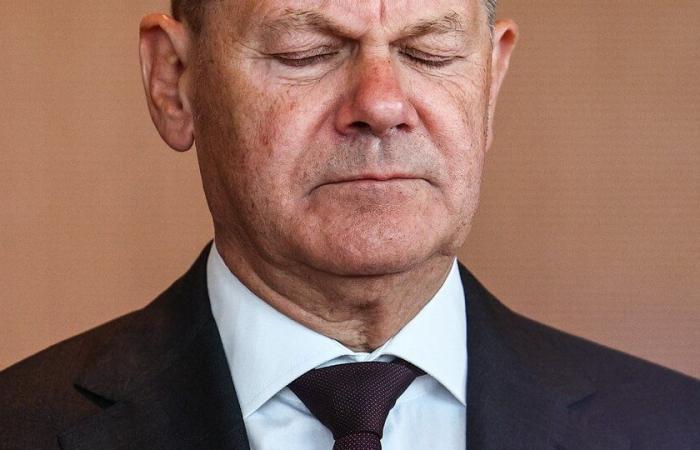
From Berlin
The results of the European elections left the German government backing down, whose member parties fell behind the right-wing and far-right options. In the last hours, Chancellor Olaf Scholz He expressed that “the result was bad for the three parties in the government” and that it is important that the ruling coalition “ensure that the country modernizes and progresses” and that it prepares to be able to “obtain the trust of citizens in the face of the next federal elections”. And in addition to his training –the Social Democratic Party of Germany (SPD), which made the worst election in its history in European elections -, his partners from the Greens and the Free Democratic Party (FDP) also worsened their performances.
Regaining trust seems difficult. After the final results were known, one image circulated more than any other in the German country. Sample again to two Germanys, as before the reunification of the early 90s, but this time divided by the majority votes on the right (the Christian Democratic Union, CDU, which remained with the West) and the extreme right (Alternative for Germany, AfD, which triumphed strongly in the former eastern territory). Only a few cities – the big ones – are painted green. An image that invites reflection for the losers but also for society as a whole, almost 35 years after the fall of the Berlin Wall.
“What happens in the East is explained because many people there consider themselves second-class citizens compared to those in the West. The promise of equal opportunities with Western Germany was not fulfilled and this is expressed, as a symptom or as a consequence, in support for the nationalist vision of the AfD. It is a very strong reaction against the elites and also against nativism, to recover German dignity,” he analyzes in dialogue with PageI12 Franco Delle Donne, doctor in Communication from the Freie Universität of Berlin specialized in German politics and the far right.
–In what sense was that promise of reunification not fulfilled?
–I give you examples. If you work the same job as someone from the West but in the East, you will earn 17 percent less. Afterwards, with some exceptions, there are no relevant companies in what was the eastern part. Furthermore, all the political elites but also in relation to command positions, for example in universities, in hospitals, are people from the west. So there is still very deep inequality. Before, this was expressed electorally in favor of the left, of the Die Linke party, a post-communist party, which, due to a matter of heritage and idiosyncrasy, was successful in the east. Now Die Linke is about to disappear and in that territory the party that is ideologically the opposite wins, but that has an ultra-nationalist vision.
–AfD also won among workers, if the data is disaggregated by activity…
–For me this is explained to a greater extent by the feeling of feeling unworthy, of not being respected, of not being listened to. The anti-system discourse appears, anti-political class that is understood as an elite and is seen as an enemy of the people. These workers, who have a less well-off position than others, reject the politicians who make decisions and do not consult them. For example with the issue of Russia, which is a super strong element here, because the war generates inflation like there has not been in a long time in Germany and that impacts the pockets of those who have the least. Before, those people stayed at home and didn’t vote. Today they vote for the AfD because they feel that it represents them. Although not all of them agree ideologically, because many actually do not. That is why it is difficult for me to affirm that there was a shift to the right ideologically in the population.
–You don’t think there was?
–I am not aware that one hundred percent of those who voted for AfD are pro-Nazis and in general when you reach those conclusions you end up misdiagnosing and end up generating more frustration in those who feel that you are not listening to them. In addition, it was said that the AfD was going to sweep and ended up below its peak, in January of this year, when it measured 24 points. If you want to see it in broader terms, throughout Europe and not just Germany, the same thing happened. The great fear was that the far-rightists were going to dominate everything and that did not happen. The numbers of the most pro-European centrist parties are quite similar in terms of average seats, although it has changed in some countries. I’m not saying it’s a result to be happy about but I don’t think it was a catastrophe either. What is undeniable is that there are things that are going to start to change but that was already coming, for example with the new immigration pact that has far-right overtones.
–The CDU has already told the Scholz government that it has to call elections. Do you think it’s going to happen?
–No, that doesn’t happen regularly in Germany. It is strange that the most important party in the country such as the CDU, which has appointed all the chancellors except for a few, calls for something like a forced change of government. I don’t know what kind of government they think they could put together, it seems to me that they would have the same problems as the current government seeing the results. I think it had more to do with a political message, like taking over the victory, but hinting at it is a big step. It is not something common in Germany.
–Any gem from the election?
–The 6% obtained by Sahra Wagenknecht, a former Die Linke who left the party and founded her own to debut in these elections. It is striking, although unlike what happened with the AfD I have my doubts that it will be sustained over time. I find it difficult in Germany to develop charismatic leadership of this style, it is not a country for that to happen. In fact, there is a political culture that rejects it, contrary to what can happen in Argentina or Latin America. And there is a logical reason, which is what happened the last time there was charismatic leadership in Germany. That’s why it’s eye-catching and something to look at.
–In September there are elections in three regions of Eastern Germany and the AfD measures very well in the polls. Do you think that Sunday’s result can be repeated in those elections or even in the federal elections next year?
–I think they do show what will most likely happen in the East at the end of the year. All the polls indicate that the AfD is going to get more than 25 or 30 percent, despite all the scandals they have been having. At the federal level it is another story, I wouldn’t take it that far, I would leave it there and then see what happens later.





